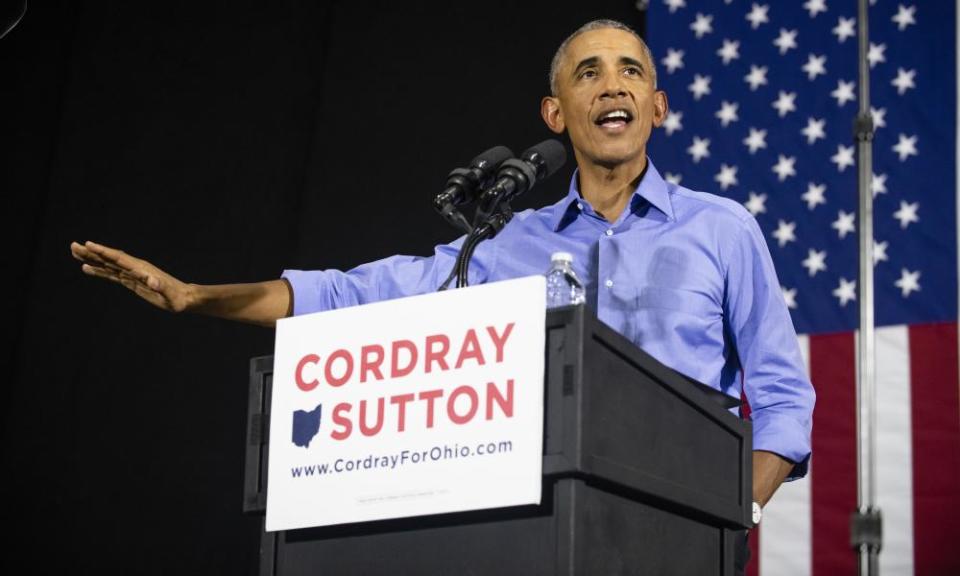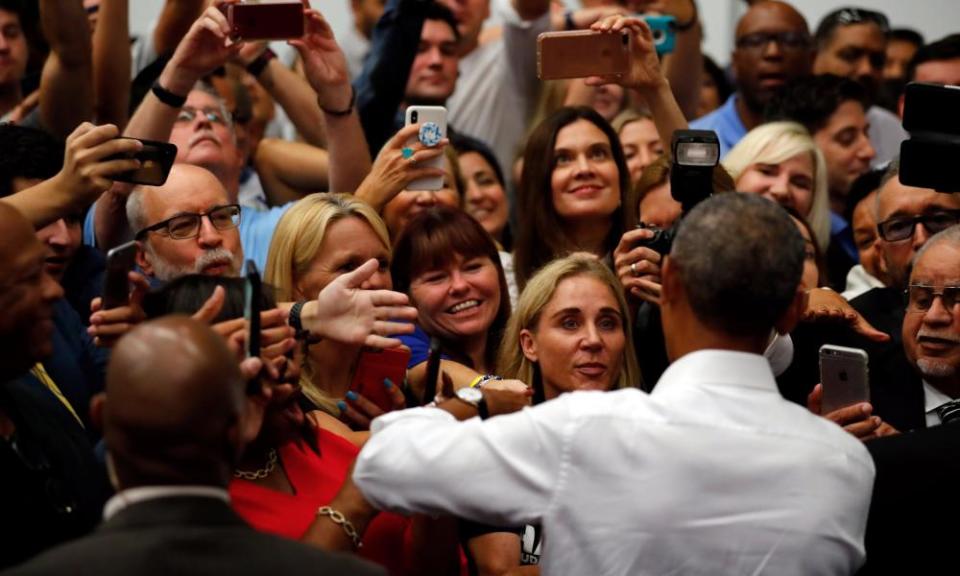Barack Obama is back to fire up the base – Democrat and Republican
The ex-president is on the trail for the midterms, attacking Donald Trump. Strategists on both sides welcome him

Barack Obama is back. After a nearly two-year absence from the national political stage, the 44th president has re-emerged as a force on the campaign trail – and a striking contrast to the man who now occupies the White House.
Obama is the most powerful figure in Democratic politics – and Donald Trump’s favorite foil. His return is an opportunity for both parties to focus on his legacy and rally supporters ahead of the November midterm elections.
“I need you to come through,” Obama told thousands at a rally in Cleveland on Thursday, in support of the Democratic candidate for governor of Ohio, Richard Cordray. “But more importantly, the country needs you to come through.”
His message was simple but urgent: vote, because the consequences of staying home are “far more dangerous” now. Obama did not name Trump but his target was hardly veiled.
I need you to come through. But more importantly, the country needs you to come through
Obama to Ohio Democrats
“Obama comes to Ohio to campaign for [Cordray] and thinks the best way to help him is to attack President Trump?” the Ohio Republican party shot back on Twitter. “He must have forgotten that Trump won Ohio by a much wider margin than he did! Ohio is better off now thanks to @realDonaldTrump!”
Obama and Trump have almost nothing in common, save for their near singular ability to rally their party’s supporters and energize opponents.
Last month, Obama released a wave of 81 endorsements. The list included governors, congressmen, senators and 40 candidates for state legislative seats.
His full campaign schedule is still taking shape and more events are expected. Katie Hill, a spokeswoman for the former president, said he will prioritize races that are key to winning the House and building in the Senate, and also races relevant to congressional redistricting, which will take place after the next census in 2020. Many state officials who will be in charge of drawing those maps will be elected before then.
On Friday, Obama will campaign in Philadelphia, in a state he won twice but which Trump carried in 2016. It is key to redistricting plans. Later this month, he will hold a fundraiser in New York City for the National Democratic Redistricting Committee, a group led by his former attorney general Eric Holder that is focused on redrawing gerrymandered maps that have helped cement Republican control in Washington and at state level.
‘Name your enemy’
As Trump has dismantled his legacy, Obama has remained largely silent, weighing in intermittently and usually in the form of a written statement. Trump has frequently lashed out.
Then, at a debut rally in Illinois this month, Obama invoked Trump twice by name. He denounced politics of “fear and resentment” and said Trump’s disregard for democratic norms posed an unprecedented threat to civil society.
“It did not start with Donald Trump,” Obama insisted. “He is a symptom, not the cause.”
Trump, famously sensitive to criticism, told an audience in North Dakota he tried to watch Obama’s speech but “fell asleep”.
Jim Manley, a Democratic strategist who was an aide to the former Senate majority leader Harry Reid, said he thought Obama was effective when he took the fight to Trump.
This election is going to be all about Donald Trump. If you’re going to get in the ring, you’ve got to name your enemy
Jim Manley
“This election is going to be all about Donald Trump,” he said, adding: “If you’re going to get in the ring, you’ve got to name your enemy.”
Democrats say Obama has the unique capacity to unify the party after a primary season of ideological and intergenerational rifts. They enter the midterms confident they can win the 23 seats needed to wrest control of the House; the Senate is a harder task but may be possible too.
Many of the most competitive races are in conservative-leaning suburbs, where Trump is intensely unpopular. Such districts are where Obama could be most potent, said Jesse Ferguson, a strategist and the former director of the Democratic Congressional Campaign Committee’s independent expenditure arm.
“Democratic candidates running in suburban districts are likely making his phone ring off the hook,” he said. “If Donald Trump called a Republican candidate running in a suburban district right now, they’d likely pick up and say: ‘New phone, who dis?’”
At an invite-only rally in Anaheim last week, Josh Harder was one of six “Hillary Clinton candidates” – California Democrats running to replace House Republicans in districts she carried in 2016 – who joined Obama on stage.

Obama waved a clipboard at the volunteers in the room. Electing Democrats in November is imperative, he warned, because “things can get worse”.
For the voters and volunteers of the Central Valley district where Harder is running, Obama’s message, he said, was a “powerful reminder of a not-too distant past when we had civility in our politics and politicians that we could believe in”.
‘Motivating effect’
Republicans too welcome Obama back to the trail. Lanhee Chen, a fellow at Stanford’s Hoover Institution and a one-time adviser to Mitt Romney’s presidential campaign, said Obama has a patchy record of success helping Democrats in elections when his name is not on the ballot.
The next several weeks of campaign appearances, Chen said, will test whether the president of “hope and change” can still inspire the voters who helped elect him twice.
“The question,” Chen said, “becomes: which effect is bigger? The motivating effect on the progressive base or the motivating effect on the conservative base.”
Michael Steel, a Republican strategist and former aide to ex-House speaker John Boehner, said Obama would rally the right as well as the left. His presence on the campaign trail, Steel said: “will remind Republican voters that a Democratic victory means higher taxes, more regulation, and fewer jobs, plus Nancy Pelosi again wielding the speaker’s gavel, and – inevitably – the impeachment of President Trump”.

